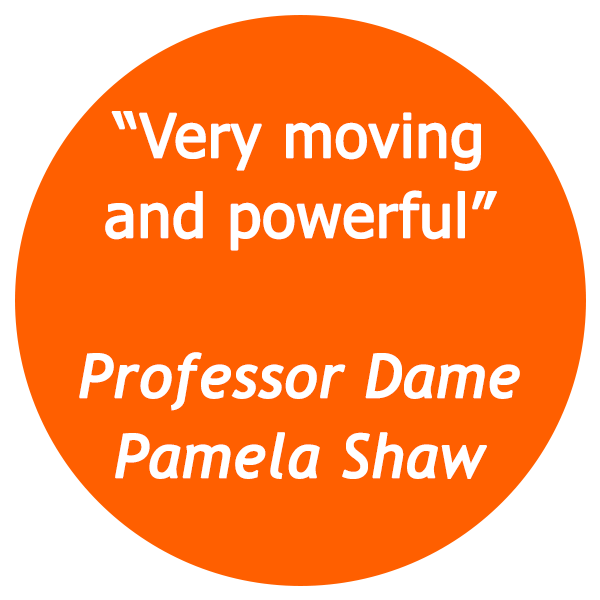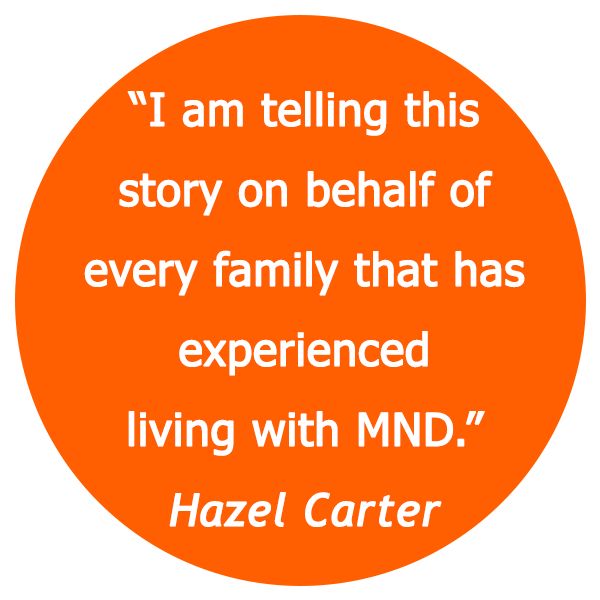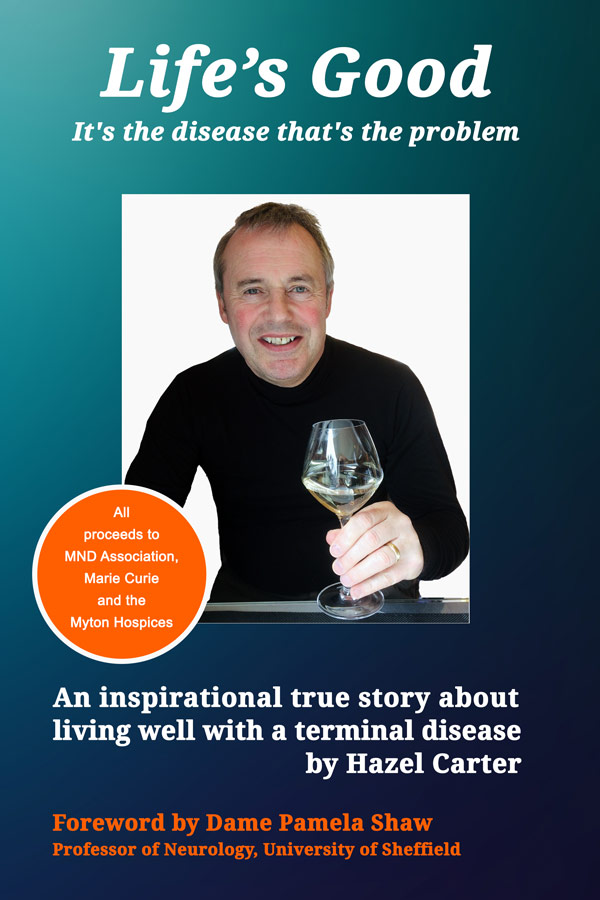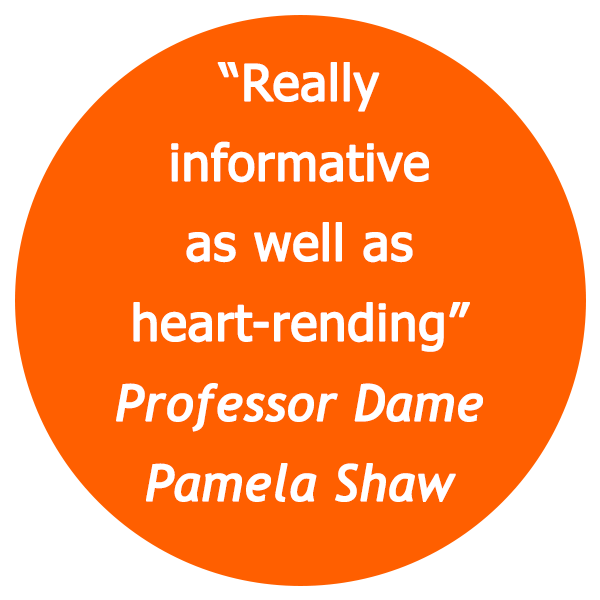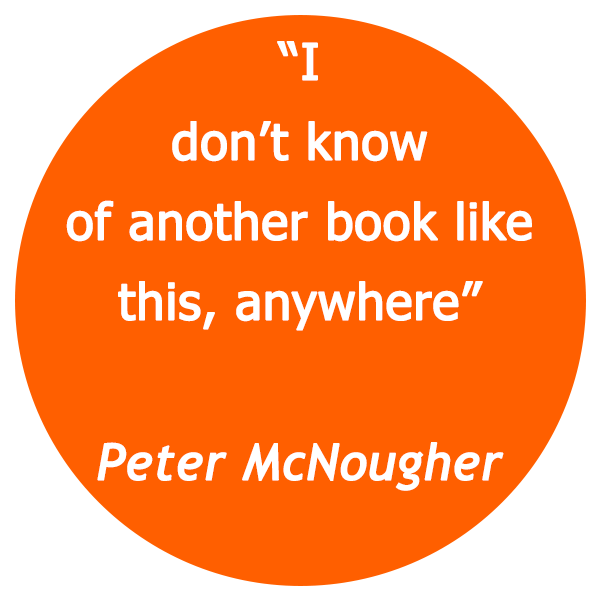Foreword by Professor Dame Pamela Shaw
Professor Dame Pamela Shaw DBE MBBS MD FRCP FMedSci FAAN FANA FAAAS
Professor of Neurology
Honorary Consultant Neurologist, Sheffield Teaching Hospitals NHS Foundation Trust
Director of the Sheffield Institute for Translational Neuroscience (SITraN)
Director Sheffield NIHR Biomedical Research Centre for Translational Neuroscience
Director of the cross-faculty Neuroscience Research Institute University of Sheffield
Professor Dame Pamela Shaw DBE MBBS MD FRCP FMedSci FAAN FANA FAAAS
Professor of Neurology
Honorary Consultant Neurologist, Sheffield Teaching Hospitals NHS Foundation Trust
Director of the Sheffield Institute for Translational Neuroscience (SITraN)
Director Sheffield NIHR Biomedical Research Centre for Translational Neuroscience
Director of the cross-faculty Neuroscience Research Institute University of Sheffield
Hazel Carter has written a very moving and vivid account of the remarkable journey she and her husband Alan Carter made as a couple through the distressing and difficult 18 months from receiving his diagnosis of motor neurone disease (MND) in November 2017 to the end of Alan’s life in 2019.
Hazel’s courageous intentions in writing this manuscript have been to provide information, practical advice and support to people living with MND and their families and friends; to provide a detailed perspective on MND for the whole range of health care professionals involved in the care of MND patients; and to inform government, policy makers and funding bodies about MND and the huge unmet need for more effective neuroprotective therapies to slow down disease progression.
She presents a graphic daily journal of what life was like for them, as a devoted couple, throughout this 18 month journey. She has succeeded very well in filling a void in the understanding of anyone who has not been through this experience – giving examples of how to be an effective carer and moral supporter of her husband and detailing the daily routines, coping strategies and lessons learned along the way.
She has taught me, as an experienced MND neurologist, things I didn’t know, such as the existence of radar keys for access to public disability toilets, and tilt-in-space shower chairs.
Alan was clearly a wonderful, inspirational person who loved life and adored his wife. He was very fit and athletic, enjoying cycling, running, fell walking and skiing. Clearly, he was loved and admired by family, colleagues and a huge network of friends. Through these pages his remarkable human spirit and stoicism emerges, coping with the devastating effects of rapidly progressive MND with great courage and determination and without losing his sense of humour. His grace and dignity in the face of adversity, including the support needed with the most personal of daily activities, is very clear.
The emotional impact and fears when confronted by the rapid deterioration of his condition are vividly described, as is his constant concern for the impact of his illness on Hazel. This portrayal of Alan reinforces my view that MND tends to happen to the nicest of people, often very active and sporty, and who somehow can face this devastating disease with a huge amount of stoicism and dignity.
Hazel is a real heroine. Alan was the love of her life, and she made it her mission to help her husband to enjoy his life and bring him hope, fun and every possible support both physically and psychologically, despite the impact of disease. She put great thought into creating special times for them both including embracing Sunderland football club events and magical holidays! She achieved all this despite the constant fear for the future and emotional pain, which at times made her physically unwell.
A vivid picture of the impact of MND emerges from her descriptions of daily life – the sleepless nights, the loss of a successful career which she enjoyed, the times feeling more like a nurse than a wife, the conversion of their lovely home, Carter Castle, into a house filled with constant comings and goings and medical equipment, the feeling at times that the burden of all that needed to be done as overwhelming. Alan and Hazel, a popular and very special couple, received wonderful support from their family and network of friends. Visitors came almost every day to offer comfort, support and practical help. Their difficult situation brought out the very best in people, including at times the kindness of strangers. With this support, Hazel wisely sometimes found time to “recharge her batteries” with occasional games of golf, a few days of skiing and meetings with friends. The input from health care professionals and carers was in general excellent, but Hazel was a tigress on behalf of her husband when an occasional person did not provide the right level of caring support.
MND is a devastating condition, which varies in terms of its speed of progression. When progression is rapid, as in Alan’s case, it is both extremely frightening for all involved and, in his case, meant that he could not be included in the clinical trial participation he was hoping for. No sooner does one disabling symptom arise, when another problem rapidly follows. Progress has been made in recent years, both in terms of symptom management and neuroprotective therapy developments, though the pace of medicine and science seems frustratingly slow for those impacted by MND.
I and other specialists in this field of medicine, regard MND in 2023 as a neurodegenerative condition poised for the emergence of more effective treatments in the near future (Nature Reviews Drug Discovery Dec 21;2022:1-28 PMID:36543887). The UK government recently pledged £50M of research funding over 5 years to create a national MND Research Institute, persuaded by people living with MND, including famous sports personalities, as well as neurologists and neuroscientists. We believe that this will create a “step-change” in the way that effective therapies can be developed and allow greater access for MND patients to clinical trials.
I very much hope the politicians and research funders who can make this national institute a reality, will read this heart-rending account of this devastating disease, with a life-time risk of 1 in 300 people, and provide the funding to make this step-change a reality.
For Alan’s sake, and the many other patients who will face this journey in the future, I sincerely hope this compelling and excellent account will contribute to realising the urgent need to accelerate and fund our efforts to find effective treatments for MND.
Professor Dame Pamela Shaw
Hazel Carter has written a very moving and vivid account of the remarkable journey she and her husband Alan Carter made as a couple through the distressing and difficult 18 months from receiving his diagnosis of motor neurone disease (MND) in November 2017 to the end of Alan’s life in 2019.
Hazel’s courageous intentions in writing this manuscript have been to provide information, practical advice and support to people living with MND and their families and friends; to provide a detailed perspective on MND for the whole range of health care professionals involved in the care of MND patients; and to inform government, policy makers and funding bodies about MND and the huge unmet need for more effective neuroprotective therapies to slow down disease progression.
She presents a graphic daily journal of what life was like for them, as a devoted couple, throughout this 18 month journey. She has succeeded very well in filling a void in the understanding of anyone who has not been through this experience – giving examples of how to be an effective carer and moral supporter of her husband and detailing the daily routines, coping strategies and lessons learned along the way.
She has taught me, as an experienced MND neurologist, things I didn’t know, such as the existence of radar keys for access to public disability toilets, and tilt-in-space shower chairs.
Alan was clearly a wonderful, inspirational person who loved life and adored his wife. He was very fit and athletic, enjoying cycling, running, fell walking and skiing. Clearly, he was loved and admired by family, colleagues and a huge network of friends. Through these pages his remarkable human spirit and stoicism emerges, coping with the devastating effects of rapidly progressive MND with great courage and determination and without losing his sense of humour. His grace and dignity in the face of adversity, including the support needed with the most personal of daily activities, is very clear.
The emotional impact and fears when confronted by the rapid deterioration of his condition are vividly described, as is his constant concern for the impact of his illness on Hazel. This portrayal of Alan reinforces my view that MND tends to happen to the nicest of people, often very active and sporty, and who somehow can face this devastating disease with a huge amount of stoicism and dignity.
Hazel is a real heroine. Alan was the love of her life, and she made it her mission to help her husband to enjoy his life and bring him hope, fun and every possible support both physically and psychologically, despite the impact of disease. She put great thought into creating special times for them both including embracing Sunderland football club events and magical holidays! She achieved all this despite the constant fear for the future and emotional pain, which at times made her physically unwell.
A vivid picture of the impact of MND emerges from her descriptions of daily life – the sleepless nights, the loss of a successful career which she enjoyed, the times feeling more like a nurse than a wife, the conversion of their lovely home, Carter Castle, into a house filled with constant comings and goings and medical equipment, the feeling at times that the burden of all that needed to be done as overwhelming. Alan and Hazel, a popular and very special couple, received wonderful support from their family and network of friends. Visitors came almost every day to offer comfort, support and practical help. Their difficult situation brought out the very best in people, including at times the kindness of strangers. With this support, Hazel wisely sometimes found time to “recharge her batteries” with occasional games of golf, a few days of skiing and meetings with friends. The input from health care professionals and carers was in general excellent, but Hazel was a tigress on behalf of her husband when an occasional person did not provide the right level of caring support.
MND is a devastating condition, which varies in terms of its speed of progression. When progression is rapid, as in Alan’s case, it is both extremely frightening for all involved and, in his case, meant that he could not be included in the clinical trial participation he was hoping for. No sooner does one disabling symptom arise, when another problem rapidly follows. Progress has been made in recent years, both in terms of symptom management and neuroprotective therapy developments, though the pace of medicine and science seems frustratingly slow for those impacted by MND.
I and other specialists in this field of medicine, regard MND in 2023 as a neurodegenerative condition poised for the emergence of more effective treatments in the near future (Nature Reviews Drug Discovery Dec 21;2022:1-28 PMID:36543887). The UK government recently pledged £50M of research funding over 5 years to create a national MND Research Institute, persuaded by people living with MND, including famous sports personalities, as well as neurologists and neuroscientists. We believe that this will create a “step-change” in the way that effective therapies can be developed and allow greater access for MND patients to clinical trials.
I very much hope the politicians and research funders who can make this national institute a reality, will read this heart-rending account of this devastating disease, with a life-time risk of 1 in 300 people, and provide the funding to make this step-change a reality.
For Alan’s sake, and the many other patients who will face this journey in the future, I sincerely hope this compelling and excellent account will contribute to realising the urgent need to accelerate and fund our efforts to find effective treatments for MND.
